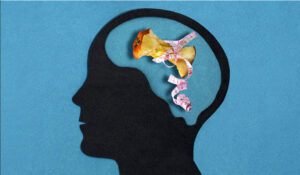Exercise anorexia is a condition that is often overlooked. People with exercise anorexia are obsessed with working out and often have very low body weight. Many people assume that exercise anorexia is just a way to stay thin, but it can be quite dangerous. In this blog post, we will discuss the symptoms of exercise anorexia, as well as the dangers associated with it. We will also provide tips on how to get help if you or someone you know is struggling with this condition.
Contents
Understanding Exercise Anorexia
 Exercise anorexia, also called compulsive exercise, is a dangerous eating disorder that can lead to serious health problems, including heart damage and death. People with exercise anorexia often become obsessed with working out, even when they are injured or sick. They may also restrict their food intake to the point of starving themselves.
Exercise anorexia, also called compulsive exercise, is a dangerous eating disorder that can lead to serious health problems, including heart damage and death. People with exercise anorexia often become obsessed with working out, even when they are injured or sick. They may also restrict their food intake to the point of starving themselves.
Compulsive exercise is often seen as positive behavior, but it can be just as harmful as other types of eating disorders. People with exercise anorexia often put their health at risk in pursuit of their workout goals. They may ignore injuries, push themselves to the point of exhaustion, and forego meals or eat very little to stay thin.
Is Exercise Anorexia And Anorexia Nervosa Are Same?
The quick answer is no, but there are similarities. Exercise anorexia is not currently recognized as a distinct eating disorder in the Diagnostic and Statistical Manual of Mental Disorders, Fifth Edition (DSM-V). However, it is included as a subtype of Other Specified Feeding or Eating Disorder (OSFED) in the DSM-V. OSFED is characterized by symptoms that cause clinically significant distress or impairment in functioning, but don’t meet the full criteria for any other feeding or eating disorder. So while exercise anorexia isn’t its distinct disorder, it’s still a serious condition that can be damaging to both your physical and mental health.
Exercise anorexia is different from anorexia nervosa, which is a separate eating disorder that is characterized by a fear of gaining weight. People with anorexia nervosa may also compulsively exercise, but they do so to lose weight, not out of a desire to stay fit or healthy.
Symptoms Of Exercise Anorexia
Exercise anorexia is a dangerous condition that can lead to severe health complications, including death.
- The condition is characterized by an intense fear of gaining weight, a preoccupation with exercise, and an extreme restriction of food intake.
- People with exercise anorexia often spend hours exercising and may skip meals or restrict their caloric intake to dangerously low levels.
- They may also compulsively exercise even when they are injured or sick.
If you or someone you know has these symptoms, it’s important to seek professional help. Exercise anorexia is a serious condition that can be deadly if left untreated.
What Triggers Exercise Anorexia?
Several factors can trigger exercise anorexia. They are as follows:
- People with exercise anorexia often have a distorted view of their bodies, thinking they are much heavier than they are. This can lead to severe weight loss and malnutrition.
- For some people, it may be triggered by a traumatic event such as being teased about their weight. For others, it may be due to a need to control their environment or themselves. And for some people, it may be a combination of both.
- For some people, the need to control their weight and shape becomes an obsession. This can lead them to develop exercise anorexia, a dangerous condition where they become fixated on exercising and lose excessive amounts of weight.
If you think you or someone you know may have exercise anorexia, it’s important to seek help from a professional. Exercise anorexia can be very dangerous and even life-threatening if not treated. With proper treatment, however, people with exercise anorexia can recover and lead healthy lives.
Consequences
Exercise anorexia is characterized by obsessive calorie counting and compulsive exercise. sufferers often forego food and water to burn more calories. This can lead to:
- severe dehydration
- electrolyte imbalances
- heart problems
- kidney damage
- bone loss
- malnutrition
While it may seem like exercising more and eating less would lead to weight loss, the truth is that this kind of disordered behavior can lead to weight gain in the long run. When the body is deprived of calories, it goes into starvation mode and starts to hold onto fat. In addition, this type of behavior can lead to a dangerous obsession with weight and body image. If you or someone you know is struggling with exercise anorexia, it’s important to seek help from a medical professional.
How To Deal With Exercise Anorexia?
 To deal with exercise anorexia, you need to first understand what it is. By identifying this, you can create a plan to deal with this disorder. A few common options are listed below:
To deal with exercise anorexia, you need to first understand what it is. By identifying this, you can create a plan to deal with this disorder. A few common options are listed below:
Seek Professional Treatment
It typically includes working with a therapist or a doctor who makes treatment plans for his patients. If you think you may have exercise anorexia, it is important to seek professional help. Treatment typically includes a combination of individual therapy, group therapy, and medical care.
Individual therapy: In this therapy, you will work with a therapist to identify the thoughts and behaviors that contribute to your exercise anorexia. You will also learn healthy coping skills and ways to deal with difficult emotions. For instance, you may learn how to deal with body image concerns and negative self-talk.
Group therapy: Group therapy can provide support and help you feel less alone in your struggle. For instance, you might learn how to cope with stressful situations in a more healthy way. You can also explore the thoughts and emotions that contribute to your exercise anorexia. It can provide support, understanding, and practical coping strategies. If you’re considering group therapy, look for a therapist who specializes in treating eating disorders.
This will help ensure that the group is focused on your needs. You can also ask whether the group is open to people at different stages of recovery. Overall, group therapy can be a helpful tool in your journey toward recovery from exercise anorexia.
Develop a support system
This can be especially helpful if you don’t have a lot of family or friends who understand what you’re going through. Find an online support group or a therapist who specializes in eating disorders. Building a support system is key to managing exercise anorexia. This can be especially helpful if you don’t have a lot of family or friends who understand what you’re going through.
Medical supervision
Medical supervision is important to monitor your physical health and make sure you are getting enough calories and nutrients. If you are not getting enough calories, your body will start to break down muscle for energy. This can lead to serious health problems, including heart damage and bone loss.
If you are struggling with exercise anorexia, please seek professional help. This is a serious condition that requires medical treatment.
Self Help Tips
There are various things you can do to help yourself if you think you may be suffering from exercise anorexia.
Educate yourself on the condition: It is important to educate yourself about the first warning signs. This way, you will be more likely to notice if your behaviors and thought patterns start to become unhealthy.
Talk to someone: If you are feeling lost, talking to a trusted friend or family member can be helpful. Sometimes it can be difficult to see things clearly when we are in the thick of it. Talking to someone who cares about you and who you trust can help give you some much-needed perspective.
Stay strong and calm: There’s a lot of emotion that can come with learning about your eating disorder. You may feel scared, frustrated, and helpless. It’s important to try to stay strong and calm. This will give you the best chance of being able to support yourself through this difficult time.
Talk to a dietician: One of the best things you can do is talk to a dietician. They can help you understand more about your disorder and how to manage it. They can also provide support and guidance on how to make changes in your eating habits.
Be gentle with yourself: If you are suffering from exercise anorexia, it is not your fault. You did not cause this condition and you can recover from it with the right help and support. Be gentle with yourself as you go through this process.
If you or someone you know is struggling with exercise anorexia, please reach out for help. There are many resources available to support you on your journey to recovery.
Conclusion
It may be concluded that exercise anorexia is a real and serious problem. It can be just as detrimental to one’s health as an eating disorder and should be treated with the same level of care. If you or someone you know is struggling with exercise anorexia, please seek professional help.
Also, there are a few things you can do to start on the road to recovery. Make sure that you are getting enough calories and nutrients by eating a balanced diet and taking vitamins if necessary. And get rid of any type of exercise equipment that you have in your house. Start slowly with exercise and gradually increase the intensity and duration as you are able.
For further information and suggestions, please contact Therapy Mantra. We have a team of expert therapists and psychiatrists that can help you overcome this problem. Get in touch with us right away to learn more about our services. You may also make an online therapy session or download our free Android or iOS app. You can also try our Online Fitness Program.


